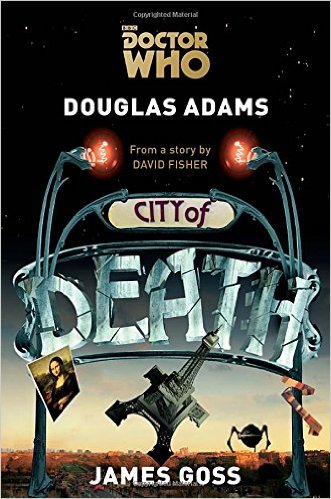Doctor Who: City of Death, by James Goss and Douglas Adams
Oct 12
2015

Beyond coveting one of the character's trademark scarves, I've never been a Doctor Who fan. I am, however, a big Douglas Adams nerd, so when I was offered a novelization of the famous Doctor Who serial City of Death—written partially by Adams—I accepted it, my lack of Doctor Who knowledge be damned. This, my friends, is why God gave us Wikipedia.
If I'm following this correctly, the original City of Death was a four-part series that aired in 1979 and was based on a script by David Fisher. The story required extensive revision (which Fisher was unable to provide), so Douglas Adams—the series' script editor at the time—and producer Gareth Williams sat down and wrote a new script on the fly, which current Doctor Who producer and author James Goss turned into a full-length novel. The end result is a loopy tale about Paris, stealing the Mona Lisa, and the Doctor and his Companion attempting to prevent the evil alien responsible for much of human development from traveling back to the dawn of time and hitting the “reset” button.
I've never seen City of Death, so I can't judge how well Goss captures the flavor of the episodes, but he gets full marks for his imitation of Adams's style. Check out the following passage, which would leave any Hitchhiker's Guide fanfic writer—up to and including Eoin Colfer—green with envy:
Review based on publisher-provided copy.
If I'm following this correctly, the original City of Death was a four-part series that aired in 1979 and was based on a script by David Fisher. The story required extensive revision (which Fisher was unable to provide), so Douglas Adams—the series' script editor at the time—and producer Gareth Williams sat down and wrote a new script on the fly, which current Doctor Who producer and author James Goss turned into a full-length novel. The end result is a loopy tale about Paris, stealing the Mona Lisa, and the Doctor and his Companion attempting to prevent the evil alien responsible for much of human development from traveling back to the dawn of time and hitting the “reset” button.
I've never seen City of Death, so I can't judge how well Goss captures the flavor of the episodes, but he gets full marks for his imitation of Adams's style. Check out the following passage, which would leave any Hitchhiker's Guide fanfic writer—up to and including Eoin Colfer—green with envy:
"Much has been written over the centuries about the Mona Lisa. Some critics have acclaimed it as the first portrait of an ordinary person being ordinary. Others have claimed it contains mystical and hidden symbolism, from pyramids to a self-portrait of the artist. Some have speculated as to why the painting languished in relative obscurity until the turn of the twentieth century, when it suddenly rocketed in fame and value. Very little has been written on the tricksy topic of exactly why Leonardo da Vinci left the eyebrows off. Possibly because, up until that precise moment in Paris, Earth, 1979, no one had ever really spotted that this was a problem.See? And in addition to Goss's remarkable gift for Adams pastiche, City of Death is the kind of funny, ambitious, action-packed adventure that actual Who fans will adore, and can easily be enjoyed even by those of us whose prior knowledge of Doctor Who can be summed up with a vague: “Something to do with time travel? And phone booths? Oh, and a really nice scarf?”
'What? Is that all you can say? No eyebrows! This is the Mona Lisa you're talking about.' The Doctor whipped around, startling someone from Portugal who was about to risk flouting the ban on flash photography. The Doctor glared at the painting. It was the same look he'd recently used against the Black Guardian while he was mending the universe (which he had done by switching it off and then back on again). 'The Mona... Good Lord, you're right, she hasn't got any eyebrows, has she? You know, I never noticed that before.'
Stumped, the Doctor ground to a halt.
Romana marked up her attempt at gently distracting the Doctor as a decided failure. He really could be terribly hard work. If only K-9 were here. He'd make a pithy remark about pigments, or his batteries would run down, or some tourists would try and buy him or something, anything. As it was they were very much the centre of attention. She'd already spotted seven surveillance cameras, fourteen thief-baffling devices and one security guard frantically stabbing a concealed button in the wall. The good news was that, thanks to the TARDIS's telepathic translation circuits, the French she was soon going to need to for 'Please release my uncle from that straitjacket' would be impeccable."
Review based on publisher-provided copy.
Posted by: Julianka
No new comments are allowed on this post.
Comments
No comments yet. Be the first!